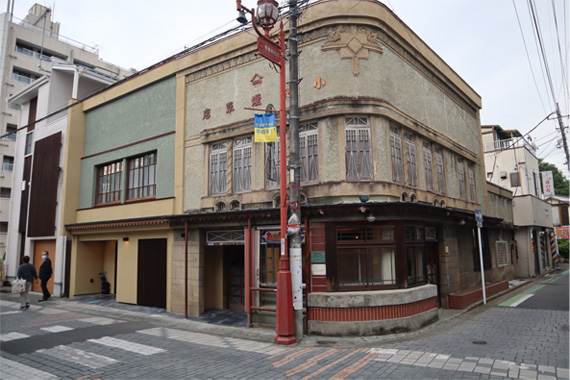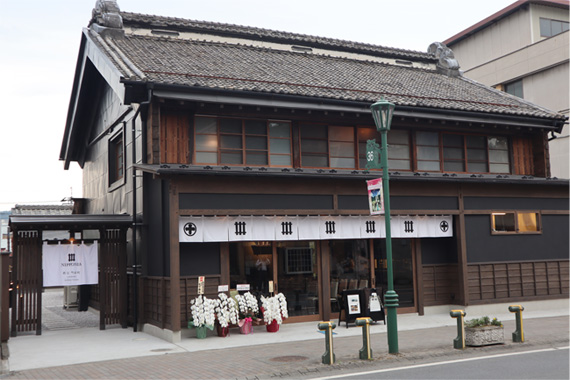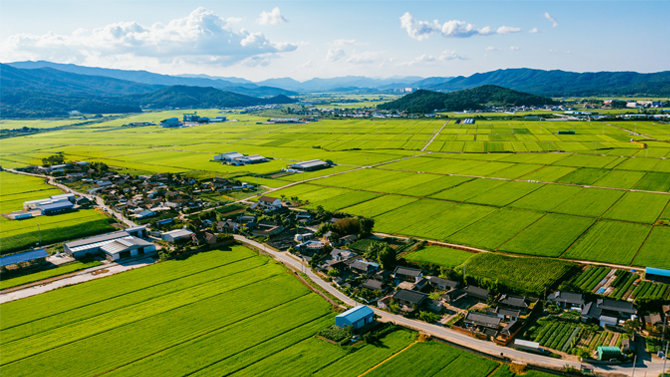Social Issues addressed by Sumitomo —Compass for the Future—
Breathing new life into regional economies by repurposing historical buildings as a partner of local companies—logical extension of SMFL’s role as a source of financial services for hotel operators nationwide
 Regional revitalization
Regional revitalizationAt SMFL, the Next Business Development Dept. is spearheading the company’s efforts to develop new businesses. With regional revitalization as one of its focus areas, SMFL has been pursuing initiatives since circa 2015.
SMFL previously supported small and medium-sized operators of tourist accommodation in Japan’s regions through financing. In the course of offering services and solutions to these clients, it became clear that their participation in the local economy extends beyond providing accommodation to include a wide range of municipal and tourism-related initiatives. The success of their businesses is intimately connected to the vitality of the regions in which they are based.
In view of the concerns shared by the regions of Japan, SMFL decided to go beyond the provision of financial services to become a business partner directly involved in promising regional revitalization projects. The first project involved repurposing traditional houses as hotel accommodation in Dazaifu City, Fukuoka Prefecture. In 2016, SMFL was approached with a view to its participation in initiatives to help Dazaifu City thrive as a tourist destination. Although some 10 million tourists come to Dazaifu each year, their visits are brief because of the lack of accommodation. The idea was to utilize vacant buildings in Dazaifu City whose traditional architecture would be attractive to tourists. Seeing this as an opportunity to contribute to regional revitalization, SMFL decided to participate in the project.
Through joint investment with local partners Nishi-Nippon Railroad Co., Ltd. and The Bank of Fukuoka, Ltd., SMFL established Dazaifu Co-Creation Co., Ltd. in January 2019. HOTEL CULTIA DAZAIFU was opened in October 2019, which is a decentralized hotel comprising refurbished traditional Japanese houses dispersed around the Dazaifu Tenmangu Shrine. Two additional accommodation facilities were opened in March 2021.
In Nara Prefecture, SMFL’s subsidiary SMFL MIRAI Partners Company, Limited, established the Nara Kominka Machidukuri Fund Investment Limited Liability Partnership together with The Nanto Bank, Ltd. and NOTE Co., Ltd, an operator of decentralized accommodation facilities at various locations in Japan that utilize local resources, such as historical buildings. With the fund’s support, NIPPONIA Tawaramoto Maruto Shoyu, a hotel created in the premises of a former soy sauce brewery, which was founded in 1689 and closed in 1949, opened in August 2020. It even resumed soy sauce brewing and began soy sauce sales in March 2022.
Chichibu City’s tourism problem was similar to that of Dazaifu City. Chichibu is blessed with a wonderful natural environment, a rich cultural heritage typified by the Chichibu Night Festival, and numerous shrines and temples, collectively known as the 34 Chichibu Fudasho—Buddhist temples on a pilgrimage route, like pearls on a necklace—making it an area of great historical interest. But despite the throngs of tourists heading for Chichibu City, lack of accommodation meant most visitors were day trippers.
To further enhance Chichibu’s attractiveness and encourage visitors to linger amid its charms, three traditional buildings near Seibu-Chichibu Station in Chichibu City, Saitama Prefecture, were reborn as decentralized accommodation facilities in August 2022. They are Koike Tobacco Shop (a registered tangible cultural property), Miyatani Footwear Shop (attached to Koike Tobacco Shop) and Maruju Pharmacy. Koike Tobacco Shop and Miyatani Footwear Store built in the early Showa era and Maruju Pharmacy built in the early Meiji era are cherished landmarks in Chichibu. Thanks to Chichibu Shrine and Mt. Buko, the Chichibu area has long been a place of pilgrimage. Taking its cue from this abundance of history and tradition, the new hotel was named NIPPONIA Chichibu Shrine Town and will promote tourism and regional revitalization by capitalizing on the historical buildings it has repurposed.


This project was launched in 2020, led by Chichibu Machidukuri Co., Ltd, an enterprise whose mission is to achieve sustainable revitalization of the Chichibu area. As a partner in this Chichibu community development project, SMFL is jointly investing in Chichibu Machidukuri Co., Ltd with Seibu Realty Solutions Inc., Chichibu Omotenashi Tourism Organization, which is a general incorporated association promoting tourism in Chichibu, and NOTE.
Chichibu Machidukuri Co., Ltd plans to continue developing business in the “satoyama”—a term of Japanese origin referring to the border zone between mountain foothills and arable plain—and the backwoods of Chichibu, not least through the promotion of the tourism sector in Chichibu so that more people can experience the wealth of history and culture that makes Chichibu such a memorable and thoroughly enjoyable place to visit.
Through its regional revitalization initiatives linked to community-based projects, SMFL is contributing to sustainable development of communities while always respecting and appreciating their unique local history and culture.



Read about initiatives to achieve a low-carbon society, aiming at net-zero greenhouse gas emissions since these emissions are implicated in global warming.

In view of ongoing globalization and the growing complexity of supply chains, companies need to respond appropriately to issues in supply chains.

The pace of workstyle reform is accelerating as the COVID-19 pandemic has prompted numerous companies to embrace novel ways of working.

For companies, the COVID-19 pandemic has brought the crucial importance of employee health into sharp focus.

Accelerating global warming poses serious business risks. Accordingly, companies need to formulate strategies and implement specific countermeasures from a medium- to long-term perspective.

Spurred by efforts to reduce environmental impacts and in line with increasing social needs, replacement of gasoline-powered vehicles with electric vehicles is accelerating.

Vigorous initiatives are afoot to tackle social issues by revitalizing communities and the interpersonal relationships that bind them together.

Poverty persists in contemporary Japan and the existence of child poverty is a grave concern.

In view of the continuing decline of Japan’s working age population, due to population aging coupled with a low birthrate, development of the next generation is an urgent issue.

The rapid progress in medicine in recent years is largely due to the efforts of not only universities and other research institutions but also of companies to develop cutting-edge technologies.

Numerous initiatives to promote industry and commerce at the regional and community level are underway, involving the use of renewable energy and thus contributing to decarbonization.

One-third of food produced is lost or wasted globally, amounting to about 1.3 billion tons per year. Food loss and waste is a pressing issue in need of a solution.

Companies are addressing a wide range of issues so that people and companies can coexist in harmony with the global environment.

In addition to natural disasters, there are various types of hazards whose nature, incidence and severity are changing with the times. Resilience and flexibility are indispensable in dealing with them.

Read about initiatives to achieve sustainable regional revitalization. The attributes and resources that each region can offer are leveraged to strengthen local economies and overcome the problem of population decline.